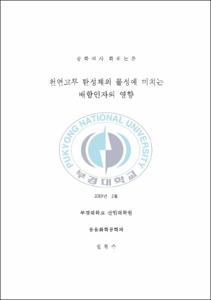천연고무 탄성체의 물성에 미치는 배합인자의 영향
- Alternative Title
- Effect of Compound Parameters on the Physical Properties of NR Vulcanized Rubber
- Abstract
- Tire is only part that contacts the ground supporting load of vehicle and transmission the power of engine to the ground.
Recently, tires are requested to have economics (Rolling Resistance), Safety (Wet Grip) and harmless to human body, high performance, eco-friendly tread rubber compound.
Generally, since the braking, wear, rolling resistance performance of tire tread rubber are having conflicting characteristic with each other, it is widely observed that one of the characteristic performance is decreased while the other is improved.
Therefore, in this research, effect of compound parameters (emulsion SBR, solution SBR, silica & silane coupling agent, process oil) on the physical properties of NR vulcanized rubber has been studied.
This study shows that the most affected factors are chain end modification of chemical solution SBR in braking power, silica & silane coupling agent in rolling resistance, Tg of polymer in wear resistance, respectively. Thus, if the compound parameters are selected properly, tread compound rubber can be designed to satisfy balance of economics, safety and wear. In addition, mixing processed oil can be chosen ether low PCA or low PAHs oil, which are not including any carcinogenic constituent, in accordance with characteristics of compound rubber.
- Issued Date
- 2013
- Awarded Date
- 2013. 2
- Type
- Dissertation
- Publisher
- 부경대학교
- Alternative Author(s)
- Seol, Jeom Su
- Affiliation
- 부경대학교 산업대학원
- Department
- 산업대학원 응용화학공학과
- Advisor
- 박찬영
- Table Of Contents
- Ⅰ. 서 론 ··················································································· 1
Ⅱ. 이론적 배경 ······································································· 3
Ⅲ. 실 험 ················································································· 26
Ⅳ. 결과 및 고찰
1. 경화 특성 ········································································ 35
2. 기계적 물성 및 내열노화 특성 ···································· 39
3. 마모 특성 ········································································ 45
4. 열전도도 특성 ································································ 48
5. 내오존성 ·········································································· 50
6. 열 안정성 ········································································ 55
7. 점탄성 특성 ···································································· 58
8. 공정가공유에 따른 특성 ··············································· 64
Ⅴ. 결 론 ················································································· 68
참 고 문 헌 ············································································· 69
- Degree
- Master
- Files in This Item:
-
-
Download
 천연고무 탄성체의 물성에 미치는 배합인자의 영향.pdf
기타 데이터 / 67.03 MB / Adobe PDF
천연고무 탄성체의 물성에 미치는 배합인자의 영향.pdf
기타 데이터 / 67.03 MB / Adobe PDF
-
Items in Repository are protected by copyright, with all rights reserved, unless otherwise indicated.